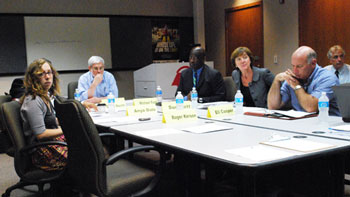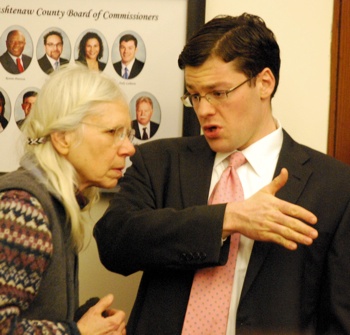Ann Arbor Transportation Authority special board meeting (July 16, 2012): Although the board does not typically schedule a monthly meeting for July, a special meeting was called because the board had business to transact that could not wait until August.

AATA board members met in a workroom at AATA headquarters for their July 16 special meeting. Clockwise around the table starting at the far left: Anya Dale, David Nacht (obscured behind Dale), Jesse Bernstein, CEO Michael Ford, Sue Gott and Eli Cooper. (Photos by the writer.)
However, the longest and most vigorous discussion took place on an item not actually on the published agenda: compliance by the AATA with Michigan’s Public Act 152, signed into law in September 2011, which limits employer health care contributions to a fixed dollar amount. At their July 16 meeting, board members took no further action on the issue, letting the vote taken at their previous meeting on June 21, 2012 stand – for now. An additional special meeting might be called sometime in the next week.
The board’s discussion of new information, obtained from the Michigan attorney general’s office, as well as additional analysis of Act 152, suggested a kind of vindication for the position of two dissenters – Charles Griffith and Roger Kerson – in the board’s June 21 action.
That action had been to limit the AATA’s contributions to no more than 80% of the non-union employee health care cost. Adopting the 80% limit is another way for a public entity to comply with Act 152. And the board had voted on June 21 to do that for its non-union employees – because open enrollment was fast approaching for those employees.
As part of that compliance decision, AATA put together a new health care option, which would allow its non-union employees to choose a health care option that would cost them the same as before – but increase their co-pays. And by the time of the July 16 meeting, employees were participating in the open enrollment process, using the boardroom for that activity.
So the board met in a smaller workroom to handle its business for the July 16 special meeting.
That business included a $60,000 increase in the contract with Steer Davies Gleave, the international consulting firm the AATA hired to assist with the development of its transit master plan. The work has included identifying new service options and financial analysis for AATA’s initiative to expand its governance and service area countywide. With this and other previous increases, the value of the contract now totals $780,622, from a deal first signed in April 2010 for just under $400,000. Some of the additional $60,000 will essentially be passed through to a local consulting firm, Carlisle Wortman Associates.
In other business, the board struck a task-order style deal for marketing and advertising with Quack! Media and Pace & Partners Inc. – a three-year arrangement that could be extended for another two years. The $500,000 total authorized by the board works out to $100,000 a year.
The board also authorized an increase in the contract it has with Blue Cab to provide its NightRide service, which operates after the hours when fixed-route service stops running. The increase is from $28 to $32 per service hour for a contract that extends through 2013. Of the $4 increase, $3 is attributed to the AATA’s relatively new living wage policy.
In a final piece of business, the board authorized a $104,000 contract with RBV Contracting to relocate a fire hydrant as part of AATA’s bus garage expansion project. [Full Story]






